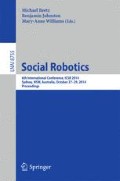Abstract
Robots deployed to assist and collaborate with humans in complex domains need the ability to represent and reason with incomplete domain knowledge, and to learn from minimal feedback obtained from non-expert human participants. This paper presents an architecture that combines the complementary strengths of Reinforcement Learning (RL) and declarative programming to support such commonsense reasoning and incremental learning of the rules governing the domain dynamics. Answer Set Prolog (ASP), a declarative language, is used to represent domain knowledge. The robot’s current beliefs, obtained by inference in the ASP program, are used to formulate the task of learning previously unknown domain rules as an RL problem. The learned rules are, in turn, encoded in the ASP program and used to plan action sequences for subsequent tasks. The architecture is illustrated and evaluated in the context of a simulated robot that plans action sequences to arrange tabletop objects in desired configurations.
Access this chapter
Tax calculation will be finalised at checkout
Purchases are for personal use only
Preview
Unable to display preview. Download preview PDF.
References
Aerolla, M.: Incorporating Human and Environmental Feedback for Robust Performance in Agent Domains. Master’s thesis, Department of Computer Science, Texas Tech University (May 2011)
Balai, E., Gelfond, M., Zhang, Y.: Towards Answer Set Programming with Sorts. In: Cabalar, P., Son, T.C. (eds.) LPNMR 2013. LNCS, vol. 8148, pp. 135–147. Springer, Heidelberg (2013)
Baral, C.: Knowledge Representation, Reasoning and Declarative Problem Solving. Cambridge University Press (2003)
Blumberg, B., Downie, M., Ivanov, Y., Berlin, M., Johnson, M.P., Tomlinson, B.: Integrated Learning for Interactive Synthetic Characters. In: International Conference on Computer Graphics and Interactive Techniques (SIGGRAPH), pp. 417–426 (2002)
Dzeroski, S., Raedt, L.D., Driessens, K.: Relational Reinforcement Learning. Machine Learning 43, 7–52 (2001)
Erdem, E., Aker, E., Patoglu, V.: Answer Set Programming for Collaborative Housekeeping Robotics: Representation, Reasoning, and Execution. Intelligent Service Robotics 5(4), 275–291 (2012)
Gelfond, M., Kahl, Y.: Knowledge Representation, Reasoning and the Design of Intelligent Agents. Cambridge University Press (2014)
Griffith, S., Subramanian, K., Scholz, J., Isbell, C., Thomaz, A.: Policy Shaping: Integrating Human Feedback with Reinforcement Learning. In: International Conference on Neural Information Processing Systems, Lake Tahoe, USA (2013)
Kaplan, F., Oudeyer, P.-Y., Kubinyi, E., Miklosi, A.: Robotic Clicker Training. Robotics and Autonomous Systems 38 (2002)
Knox, W.B., Fasel, I., Stone Design, P.: principles for creating human-shapable agents. In: AAAI Spring 2009 Symposium on Agents that Learn from Human Teachers (2009)
Knox, W.B., Stone, P.: Tamer: Training an Agent Manually via Evaluative Reinforcement. In: International Conference on Development and Learning, ICDL (2008)
Knox, W.B., Stone, P.: Combining Manual Feedback with Subsequent MDP Reward Signals for Reinforcement Learning. In: International Conference on Autonomous Agents and Multiagent Systems, AAMAS (2010)
Leone, N., Pfeifer, G., Faber, W., Eiter, T., Gottlob, G., Perri, S., Scarcello, F.: The DLV System for Knowledge Representation and Reasoning. ACM Transactions on Computational Logic 7(3), 499–562 (2006)
Sridharan, M.: Augmented Reinforcement Learning for Interaction with Non-Expert Humans in Agent Domains. In: International Conference on Machine Learning Applications, ICMLA (December 2011)
Sutton, R.S., Barto, A.G.: Reinforcement Learning: An Introduction. MIT Press (1998)
Thomaz, A., Breazeal, C.: Reinforcement Learning with Human Teachers: Evidence of Feedback and Guidance with Implications for Learning Performance. In: National Conference on Artificial Intelligence, AAAI (2006)
Watkins, C., Dayan, P.: Q-learning. Machine Learning 8, 279–292 (1992)
Zhang, S., Sridharan, M., Gelfond, M., Wyatt, J.: Integrating Probabilistic Graphical Models and Declarative Programming for Knowledge Representation and Reasoning in Robotics. In: Planning and Robotics (PlanRob) Workshop at ICAPS, Portsmouth, USA (2014)
Author information
Authors and Affiliations
Editor information
Editors and Affiliations
Rights and permissions
Copyright information
© 2014 Springer International Publishing Switzerland
About this paper
Cite this paper
Sridharan, M., Rainge, S. (2014). Integrating Reinforcement Learning and Declarative Programming to Learn Causal Laws in Dynamic Domains. In: Beetz, M., Johnston, B., Williams, MA. (eds) Social Robotics. ICSR 2014. Lecture Notes in Computer Science(), vol 8755. Springer, Cham. https://doi.org/10.1007/978-3-319-11973-1_33
Download citation
DOI: https://doi.org/10.1007/978-3-319-11973-1_33
Publisher Name: Springer, Cham
Print ISBN: 978-3-319-11972-4
Online ISBN: 978-3-319-11973-1
eBook Packages: Computer ScienceComputer Science (R0)

